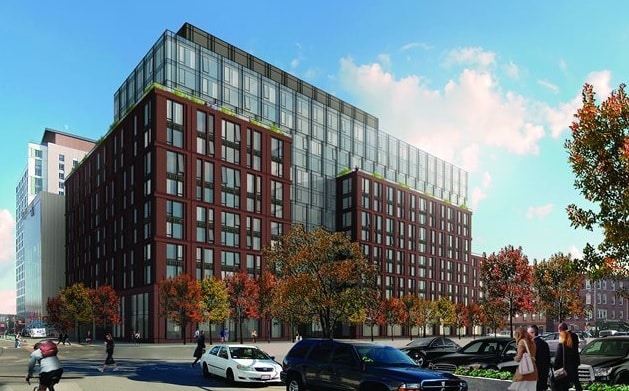The cranes are everywhere these days. After a long drought in new construction, a deluge of new downtown towers and suburban apartment buildings is taking shape across Greater Boston and in metro markets across the country
But frustration is also mounting. While the latest housing boom is now several years old, new construction has yet to make a major dent in prices and rents, which are once again shattering records again this spring.
Under pressure from housing activists and priced–out residents, some cities are taking aim at housing developers, hoping to achieve by government mandate what the market has so far, at least, failed to deliver.
Both Cambridge and Somerville require at least 20 percent of units in all new apartment and condominium developments be set aside for sale or rent at below-market rates to low and middle-income families.
For its part, San Francisco adopted the 20 percent standard two years ago.
The question now is whether Boston, the 800-pound gorilla of the region’s housing market, will follow suit and start ramping up demands on developers building new residential towers and high-rises.
The city has reportedly hired a consulting firm to look at the issue.
However, signs point to a much more cautious approach by Boston development czar Brian Golden, which is good news for anyone who believes that markets, not government mandates, are where the ultimate solution to the housing crisis will be found.
Golden Appears Skeptical of Hike
In a recent meeting in downtown Boston with developers Golden, director of the Boston Planning & Development Agency, said he is wary of copying the example of San Francisco.
The City by the Bay upped its affordable housing requirement for new projects to 20 percent, only to see a number of projects grind to a halt, Golden noted.
Speaking to members of Massachusetts NAIOP’s government affairs committee, Golden called the move an overreach, noting “20 percent of nothing is nothing,” according to an account of the meeting provided by BLDUP, a commercial real estate website.
Golden is right to be concerned. New housing construction plunged more than 40 percent in San Francisco last year.
The drop came after the city upped its affordable requirement in 2017, from about where Boston’s is right now to 18 percent for rental projects and 20 percent for condo developments.

Related Beal’s 370-380 Harrison Ave. project under construction in the South End will include 52 affordable apartments and three income-restricted condos among its 273 residential units.
Golden also pointedly noted that Seattle, where the affordable requirement is 11 percent, has seen no such drop off in its housing construction boom.
Based on those remarks, it would not seem like Boston has plans to dramatically up its affordable requirement, now at 13 percent, to match the 20 percent demanded by Cambridge, Somerville and San Francisco.
Under Mayor Marty Walsh and before him, the late, great Thomas M. Menino, Boston has long believed solving the housing crisis is ultimately a numbers game, and, if the numbers start going down, there’s no chance of ever bringing prices and rents down.
Boston planning officials also recently increased their overall goal for new housing units constructed by 2030 to 69,000 new apartments, condos and homes, up from 53,000 previously.
San Francisco a Cautionary Tale
As it stands now, Boston would seem to have a pretty decent balance, with the 13 percent affordable requirement moderate enough that it hasn’t put the kibosh on new construction.
Maybe the city can up that requirement to 14 or 15 percent and not see a big drop in new construction, though the current standard has been producing some impressive results.
Just about 2,600 affordable condos and apartments have hit the market in since 2000, when Boston launched its Inclusionary Development Policy. A little more than a fifth of those came online last year alone, according to a city report.
Gain Access to New England Premier Source for Real Estate Data
Real estate is a moving target, but with a valuable tool like RE Records Search in your arsenal, you can get a bullseye every time. The Warren Group is New England’s premier source for timely and accurate real estate data, and RE Records Search provides valuable insight to the region’s property characteristics, tax records, sales and mortgage histories, and foreclosure information.
But likely a modest bump in the required percentage of affordable units won’t please housing activists, who probably won’t be satisfied with anything less than 20 percent
Dorchester resident Lori Hurlebaus, a member of the group Dorchester Not For Sale, told The Bay State Banner that Boston should be unafraid to follow in Cambridge’s footsteps and require 20 percent of all condos and apartments in new projects be subsidized, below-market units.
“I think there’s a certain fear that if we put in higher requirements, people won’t build at all,” Hurlebaus told the paper. “But I don’t know where that’s ever happened.”
Hmm … San Francisco anyone?
Sure, it’s unlikely all new construction would dry up overnight if Boston were to dramatically hike its affordable housing requirements, but a 40 percent drop like the one San Francisco has seen would be devastating.
If Boston were to hike its affordable housing requirement from 13 percent to 20 percent of all new units, it would represent as dramatic shift.
That’s a difference of 7 percentage points, or well more than 50 percent higher than the current standard, a considerable increase given that developers will be taking a loss on these units, which, after all, can only be rented out or sold at artificial, below-market rates.
Boston Projects Already Face High Costs
It’s already hugely expensive to build in Boston. The cost of acquiring new sites in a fairly compact and densely developed city is quite high, while the cost of construction materials has been on a tear.
Labor is not cheap, either, with a tight market amid an explosion in the number of new projects.
On top of it all, getting a major project approved in a big city like Boston is a major undertaking in and of itself, with a considerable amount of risk as well.

Scott Van Voorhis
You can count on months and even years of hearings and reviews by both city and state officials, with the bill for lawyers, architects and consultants rising higher with each passing week, not to mention the “carrying costs” – read debt payments – on the development site itself.
And there’s no guarantee of a happy ending when everything is said and done, especially if there is a neighborhood backlash.
While it may not be pushing the envelope when it comes to demanding more affordable units from developers, Boston is more than holding its own when it comes to helping solve Greater Boston’s housing shortage.
As they say, if it ain’t broke, don’t fix it.
Scott Van Voorhis is Banker & Tradesman’s columnist; opinions expressed are his own. He may be reached at sbvanvoorhis@hotmail.com.




 |
| 


